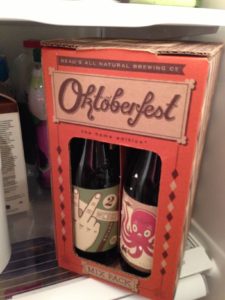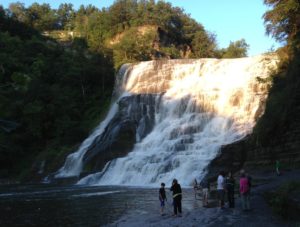I am thinking I may have a theory or at least a bit of half an idea. I was in the library yesterday waiting for the kids swim lessons next door at the Y to end and came across a copy of a book from 1913, a History of the County of Lennox and Addington by W.S. Herrington from which I found this passage from an interview of a man then in his nineties:
I remember the first election I ever witnessed. It was over seventy-five years ago, about the year 1836. John Solomon Cartwright and George H. Detlor, the Tory candidates, were running against Peter Perry and Marshall Spring Bidwell. They ran in pairs; Perry and Bidwell were called the rebels by the other side. There was only one polling place and that was in Bath. It was a little booth at the edge of the village. I was quite a young man at the time and didn’t know much about the issues; but I could understand that the people were greatly excited. The taverns of Bath were crowded with men wrangling about the votes. Whiskey was flowing freely, and there were plenty of drunken men and brawls in the streets. There were plenty of taverns all over the county. There was Charter’s tavern near the head of Hay Bay; John Davy’s over near Sandhurst, and Griffith’s in the second concession about four miles west of Charter’s. Ernesttown must have had a dozen at least.
I like these sorts of old guy interviews. Like the one from 1899 with the recollections of a ninety year old guy of his pre-Victorian youth including Albany Ale. In this recollection above, the guy being interviewed is from a farm outside the village beyond the smaller town to the west of the military, mercantile and brewing centre of Kingston. He grew up in a log cabin. The degrees of distance from the big centre, the layers of the hinterland, describe distribution. See, Ontario – or rather Upper Canada – at this time was still a tenuous proposition given the continuing uncertainty of the Republic’s intentions. It was also one run on a combination of an imperial demand economy tied to local sustainable farming. Before the 1840s repeal of the Corn Laws, crops from here were shipped to Britain and manufactured supplies were shipped back. We were part of the great Georgian hive.
It seems to me that the references to whiskey in the book are what they are – not a euphemism for drinks so much as confirmation of the drink that’s on offer. The same man quoted above stated all the crops were wheat and corn. He did’t see barley until he was in his twenties – right about the time of the repeal of the corn laws in the 1840s and the end of guaranteed supply to the empire. Elsewhere in the book a country store ledger is described. Plenty of spirit references and a few wine sales but no mention of beer. I had in my mind for a while that all the references to whiskey may have meant they were brewing their beer at home but if there’s no barley being grown that’s unlikely.
So, where was the beer going in the 1830s? Likely it stayed in town, was sold to the military or was moved by sailing ship in multi-cask loads to other centres along the shore of the big lake like York, later named Toronto. It maybe takes the railroads in the coming decades for beer to get more deeply distributed. In a world of coastal sail and carts on questionable roads, a cask of the hard stuff is probably the safer bet, the better investment for the families operating the taverns and the country stores.

 It’s Friday. Friday evening. The Friday that is the end of the first full week after summer vacation. If it was undergrad this would be the weekend you show that you learned the lessons of frosh week. But it’s not frosh week, is it? No, instead of cheap ass beer or rot gut booze it’s a glass of the dessert wine after another milestone in the generation coming up behind. Cake and wrapping paper piles. Note to file for the 13,753rd time: beer does not go better with desserts. Give me a beer with noble rot and then maybe we can talk.
It’s Friday. Friday evening. The Friday that is the end of the first full week after summer vacation. If it was undergrad this would be the weekend you show that you learned the lessons of frosh week. But it’s not frosh week, is it? No, instead of cheap ass beer or rot gut booze it’s a glass of the dessert wine after another milestone in the generation coming up behind. Cake and wrapping paper piles. Note to file for the 13,753rd time: beer does not go better with desserts. Give me a beer with noble rot and then maybe we can talk.